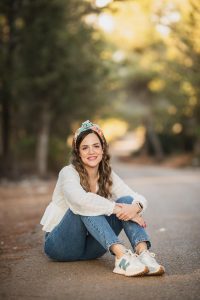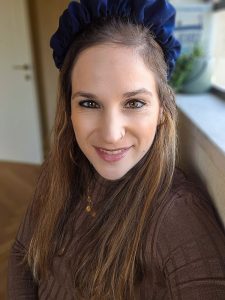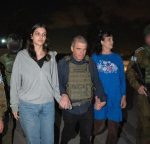

Editor of best-selling Israeli book and war widow to speak in NY
By Toby Klein Greenwald
When I was a child, there was a single panel black and white comic strip in the newspapers called “Out Our Way” that often had as a caption: “Heroes are made not born.” The comic panel, by J.R. Williams, first appeared in 1922 and after Williams died, in 1957, continued till 1977 written by others.
I recalled this line when reading that the name of a lecture that Hadassa Ben-Ari gives to youth is titled: “Heroes Aren’t Born Overnight.” It grew from the book, which was a best-seller in Hebrew, now available in English, that Ben-Ari edited, called Heroes of October 7th: Heroic Stories for Children, published by Yediot Books. All 200 stories, along with educational curriculum tips, can be seen on giborim-kids.com.
Ben-Ari will be speaking at North Shore Hebrew Academy in Great Neck and Beth Sholom in Lawrence on February 25. (Details of these and other locations, in N.J. and Philadelphia, can be found by contacting yehudit@singerpublicity.com.) A content creator and popular figure in Israel, she lives in Pardes Hanna and is the mother of seven children.
After October 7, Ben-Ari began collecting stories about heroes in Israel—both military and “ordinary” civilians—of all ages, backgrounds, and ethnicities, who used their own skills and talents to help when the nation needed it most.
She is joined on this tour by Hanna Cohen, the 32-year-old widow of Uriel Cohen, z’l, a soldier in the Givati unit who was killed by “friendly fire” in Gaza on December 19, 2023. Hanna works in Business Development at Discount Bank and gives lectures around the country about Uriel and his legacy. She lives in Tzur Hadassa with her two toddler daughters.
They will discuss the powerful lessons they have learned about inner strength, the innate goodness in people discovering the hero in ourselves in time of crisis, the challenges of adapting war stories for children, and what we can all learn from October 7 and its aftermath.
The book is sensitively illustrated by Tehila Bar-Hama, including a map of Israel that shows the location of Gaza and the Negev “envelope” communities that were attacked. The 71 portraits of heroism are presented in child-friendly language, following the guidance of a team of child psychologists.
There is an introductory chapter, “How do we talk to our children about October 7th?” that explains that the stories are meant to be read together with a grown-up. Among the many tips offered are: “Role-model a healthy emotional response by letting children know that you are also deeply saddened by the story but inspired by the heroism, strength, and resilience described.”
We meet the chess player-turned-commander who strategically led his unit to safety; the rescue teams who treated the wounded under fire, saving thousands of lives; the 85-year-old Ninja Granny who survived captivity; the dedicated school principal who sent inspiring messages to his students on his break from combat; the teenage social media influencer who began to use her platform to show the world what was really happening in Israel and more.
When I read the book, I recognized the now iconic figure of Rachel Edri, who was held by gunpoint by Hamas terrorists for 20 hours in her own home, together with her husband David and managed to placate them with cookies until rescued by the police, and the 25-year-old Inbal Rabin-Lieberman, the strong young woman who was the head of the emergency squad of Kibbutz Nir Am who saved her beautiful kibbutz with her quick thinking.
I will add a personal comment to that last example. Our daughter Adina and her husband Itay, scouting for a unique wedding venue, were the first frum couple to get married on Kibbutz Nir Am, more than 20 years ago. They brought in a kosher caterer from Netivot and the kibbutz people went out of their way to make the outside wedding wonderful, as they hoped to attract more frum couples. I will never forget their kindness, and the beauty of the pastoral kibbutz. Several years after their wedding, that area of the kibbutz was destroyed by rocket fire from Gaza. Today Adina and Itay live in the Negev. When I asked Itay after October 7 how far they are from where the atrocities of October 7 were perpetrated, he answered “About 20 minutes by car, and seven minutes as the crow flies.” From the first siren, they spent the day in their safe room. We are a small country.
Why give lectures in America? Ben-Ari says, “I believe that there is a very strong rope that connects the Diaspora to the Jews of Israel. We are planting the seeds and together, creating a future for the Jewish people. Our job is to continue strengthening that rope.
“Each story in Heroes shows the indomitable spirit and resilience of the Israeli people; real-life lessons that show how we all have the ability to step up and contribute to society in our own remarkable ways.”
To be able to tell all of these inspiring stories, they put together a group of forty team members, including writers, editors, and psychologists.
Ben-Ari says, “Writing this book was a way to remind myself and others that there are people who walk among us who knew they had a lot to lose and still protected our country. I need that reminder for myself so I can be a better person.”
Ben-Ari was born in a small neighborhood in Yavneh, where many people in the Air Force live. “My father served in the Air Force for 30 years and this was my inspiration to be a part of the meaningful history of Israel,” she says. “He would bring books about soldiers who had been awarded for bravery…I read these stories as an elementary school student, and I remember being filled with pride and a sense of security—like there was someone looking out for me and protecting me.”
“We as parents all know the feeling of trying to protect your kids from the unknown.” On October 7th, upon hearing the sirens, she gathered her seven children, “smiled at them as my blood pressure rose,” and herded them into the safe room.
“A week after the war broke out, I asked them: ‘Do you want to hear a story from the war?’ I told them about Rachel Edri from Ofakim. My kids were mesmerized. Their eyes got bigger and bigger, they smiled, they got emotional.” She told them, “I’ll tell you one heroic story a day, and I’ll also write a book…”
As she gathered the stories, she said, “I had an inner conflict as a writer. A good story has a beginning, middle, and end with a plot. But I couldn’t build up the tension to that climax, because Israel has no beginning, middle, or end, and the Israeli mother in me wanted to protect our children and keep them distant from the harsher details.”
She contacted a senior child psychologist, she says, “who specializes in child trauma in one of the best hospitals in Israel. I asked her what my red lines and limits should be…. I felt like I had an educational responsibility before I had a cultural one.
“On one hand, you grow up around Holocaust stories and what Pharaoh did to the Jews in Egypt, on the other hand, all this happened somewhere in distant history and doesn’t threaten us now.” She wanted them to have “cultural heroes beyond Spiderman and Captain America, real people that are inspirational role models that rise above personal fears and are selfless and put others before themselves…that in the harshest moments, they also see moments of grace, heroism, strength, resilience, national unity, and hope.”
Hanna Cohen says, “’In a place where there are no people, be the person.’ This is a quote from Pirkei Avot (Ethics of our Fathers). People sometimes ask me where I get the strength to handle all this pain…I get a lot of strength from the Jewish belief that death is not the end. Jewish philosophy teaches that what we see as death is actually a deepening of life.
“We cannot live among these heroes because they are no longer with us. What we are left with is the ability to embrace their families, the widows, and to continue learning their stories. Beautiful stories, which will make us better people…
“Heroes aren’t born overnight and definitely not just in a time of war, but in the deeper sense of finding the way to overcome your immediate needs in order to make things better for others and for yourself.
“On the battlefield…we are brothers in arms…religious, secular, men, women, Druze, Bedouins…we are one…If we can battle side by side, we can live side by side…Our country is having a societal breakthrough. We are writing a new chapter in our story.”
Profits from this book will be donated to Brothers for Life (Achim Le’Chaim), a non-profit organization whose aim is to aid IDF soldiers injured while serving on active duty during Israel’s fight for existence.
The writer is an award-winning journalist, theater director, and the editor-in-chief of WholeFamily.com. She lives with her husband in Efrat and they have children living throughout the land of Israel.















